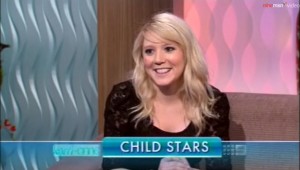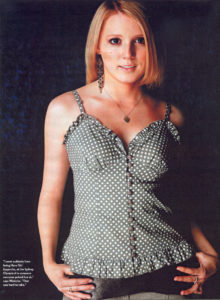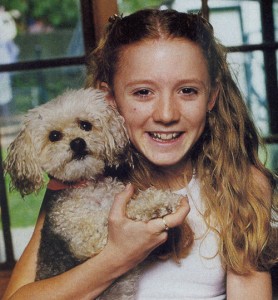
Kerri-Anne was joined by former child star Nikki Webster on the back of her advice for AGT contestant Jack Vidgen.
Kerri-Anne: Well he’s the favourite to take out Australia’s Got Talent, the final, but now 14-year-old singing sensation Jack Vidgen is receiving very disturbing death threats via Facebook, which I guess begs the question, why are we so quick to criticize people who’ve enjoyed some success?
Nikki Webster grew up in the spotlight, knows all too well how brutal people and the media can be. Now she’s offering Jack some sound advice to help him avoid Australia’s tall poppy syndrome. She joins me to discuss how challenging it can be growing up a child star. Nikki, great to see you again.
Nikki: You too, you too. Good morning.
Kerri-Anne: It was interesting your remarks and advice to Jack Vidgen. You suggested that he leave the country, what’s behind that remark?
Nikki: It wasn’t so much ‘Get out of Australia.’ I love Australia, this is where my career started and I’m so grateful and blessed to have had the opportunities that I’ve had, and I wouldn’t change anything for the world. But I was asked to give Jack advice, and it was more the fact that the media can get quite vicious – and I hope it doesn’t for his sake – but they can get vicious, and it can affect his passion to perform and entertain, and if that’s gonna happen then he needs to go overseas and travel the world and make music throughout the world, and then Australia’s always gonna be here and we’re always gonna love him. So that was the context, that I was saying it to him.
Kerri-Anne: Are we still in the era that we appreciate our people more when they’ve gone away, done the big stuff, and come back – are we still in that era?
Nikki: You know, I think we are still in that era. When I look at the history, you know Kylie Minogue’s gone overseas, Danni’s gone overseas, there’s a lot of stars that’ve had to go overseas.
Kerri-Anne: And they’ve copped their own. Kylie: the singing budgie.
Nikki: Horrible, yeah.
Kerri-Anne: They’ve been [through] some really tough stuff. But what was is that affected you so much? You talk about how brutal the media and people can be, what do you mean by that?
Nikki: Um, I think it was more the fact that I was a 13-year-old girl who represented my country, had a wonderful opportunity, created music after that, all my dreams were fulfilled. Got to about fifteen and all of a sudden, media personalities who I thought I had a good relationship with were making me the brunt of their jokes and, you know I was sitting at home and they weren’t letting me on their show, and I was always the punch line of jokes. And I couldn’t really work out what was going on, and I’d go to school and people would say to me, “You’re this diva,” or this, that, the other, and I was like, “But you know me, we’ve grown up together.” And people were believing what they were reading and hearing more than the relationship I had with them.
Kerri-Anne: Why do you think people turn, in Australia? Is it very much the tall poppy syndrome, an Australian thing to go through?
Nikki: You know, I think it happens all over the world. I think we do put people up on a pedestal and then we kinda need to let them get a little bit rocky and give them a hard time and see if they can fight through. But I think in Australia it happens more so with our child stars – not our sports stars, we do support our sports stars – but with performers it does happen. Yes, everyone knows I went through it and I’m not crying out saying I want an apology. It happens.
Kerri-Anne: What was the most hurtful thing you remember, when you were fifteen or sixteen?
Nikki: [laughs] I think it was something where I was, I think it was on the Rove show, and they actually blew me up or something and, they had like a fake character of me and they blew me up. And I thought that was just a little bit inappropriate.
Kerri-Anne: It’s very hurtful to be constantly the butt of people’s jokes.
Nikki: And it does hurt your passion, as a child.
Kerri-Anne: And that’s what you think may happen to Jack?
Nikki: It could happen; I hope we’ve learnt and I hope we support him. He’s an incredible talent and I wish him all the best and you know I hope that we can watch his journey grow, wherever it may go musically.
Kerri-Anne: On the weekend Toddlers and Tiaras, a lot of hoo-ha about this sexualisation of young kids. How have you viewed that?
Nikki: I think we need kids to be kids. We’re only kids for such a short amount of time, we need to nurture kids, and when I opened my dance studio three years ago, it was for that reason. It was to nurture young performers, to share my experiences with them and to guide them, and protect them. You know, they’re so innocent and beautiful.
Kerri-Anne: Aren’t there parents who are just way too involved in a kid’s career?
Nikki: I think there are two sides. There are parents who live through their kids, and their kids aren’t really enjoying what they’re doing, and there are parents whose kids actually have talent, and would give up everything to make sure that kid has the best opportunity possible, to fulfil their dreams.
Kerri-Anne: Nikki, if you hadn’t been the big star you were from the Olympics, do you believe you would have had a better career and a better life?
Nikki: Not at all, not at all. My whole life has been performing. I started performing at the age of five and you know, I was doing musicals and TV, and performing and dancing. It was my dream! The fact that it came true at thirteen is just a blessing, and I wouldn’t change anything. It’s allowed me to open my dance studio, my talent agency, you know I’ve made music, I’ve done records. I’ve travelled the world and what more could a 13-year-old ask for?
Kerri-Anne: We’re just sorry for all those brickbats. Quite undeserved. But thank you.
Nikki: Definitely! Let’s support our talent and get behind them, because it’s a great thing we have incredible talent in this country.
Kerri-Anne: Well said. Nikki Webster, thank you.
Nikki: Thank you, so good to see you!
Source: Kerri-Anne
Watch the video here. View screencaps here.

 Kate Ritchie had been appearing on Home And Away for more than five years when someone moved in close behind her at a Sydney train station. Ritchie was only 14, but she still remembers the open menace of the fellow teenager. “I got off the train, a girl followed me and she thought it might be funny to tip Coca-Cola all over me,” she says.
Kate Ritchie had been appearing on Home And Away for more than five years when someone moved in close behind her at a Sydney train station. Ritchie was only 14, but she still remembers the open menace of the fellow teenager. “I got off the train, a girl followed me and she thought it might be funny to tip Coca-Cola all over me,” she says. Last time we looked, Nikki Webster wasn’t responsible for the war in Iraq, or the hike in petrol prices. In fact, there is no evidence she has ever wronged a soul. Most agree she is blessed with talent, spirit and ambition. So why are people saying such terrible things about her? Why did Rove McManus and Eddie McGuire feel it necessary to make jokes about her virginity on national TV? Why does a gossip columnist she’s never met defend her frequent attacks on the teenager because “there’s something about her that’s irritating”? And why would The Sydney Morning Herald say last month, when reporting on possible new girlfriends for James Packer: “Around the dining tables of Sydney’s harbour front mansions all sorts of names have been suggested as potential Parker mates, ranging from the sublime (Nicole Kidman) to the ridiculous (Nikki Webster)”? Want to take a shot at Webster? Get in line, folks.
Last time we looked, Nikki Webster wasn’t responsible for the war in Iraq, or the hike in petrol prices. In fact, there is no evidence she has ever wronged a soul. Most agree she is blessed with talent, spirit and ambition. So why are people saying such terrible things about her? Why did Rove McManus and Eddie McGuire feel it necessary to make jokes about her virginity on national TV? Why does a gossip columnist she’s never met defend her frequent attacks on the teenager because “there’s something about her that’s irritating”? And why would The Sydney Morning Herald say last month, when reporting on possible new girlfriends for James Packer: “Around the dining tables of Sydney’s harbour front mansions all sorts of names have been suggested as potential Parker mates, ranging from the sublime (Nicole Kidman) to the ridiculous (Nikki Webster)”? Want to take a shot at Webster? Get in line, folks. Nikki Webster is being swept off her feet. Two weeks into rehearsals of The Wizard of Oz, choreographer Kelly Aykers is nutting out a complicated dance number that sees the pocket-size Dorothy spun from partner to partner when one’s hands slip and Webster is flung into the air. She’s caught just before hitting the deck, but everyone gets a fright. “Be very careful with that young girl, please,” shouts Aykers over the piano that plays on in the rehearsal rooms at Gala studios in Sydney. “She’s very precious.” In fact, that this production is opening at all is due solely to the star power of this 14-year-old schoolgirl. “If she had said no, we wouldn’t have done it,” says Oz co-producer John Frost of the $6 million show, which opens on Nov 24 in Sydney before touring Melbourne and Brisbane early next year. “It has been done especially for her.”
Nikki Webster is being swept off her feet. Two weeks into rehearsals of The Wizard of Oz, choreographer Kelly Aykers is nutting out a complicated dance number that sees the pocket-size Dorothy spun from partner to partner when one’s hands slip and Webster is flung into the air. She’s caught just before hitting the deck, but everyone gets a fright. “Be very careful with that young girl, please,” shouts Aykers over the piano that plays on in the rehearsal rooms at Gala studios in Sydney. “She’s very precious.” In fact, that this production is opening at all is due solely to the star power of this 14-year-old schoolgirl. “If she had said no, we wouldn’t have done it,” says Oz co-producer John Frost of the $6 million show, which opens on Nov 24 in Sydney before touring Melbourne and Brisbane early next year. “It has been done especially for her.”